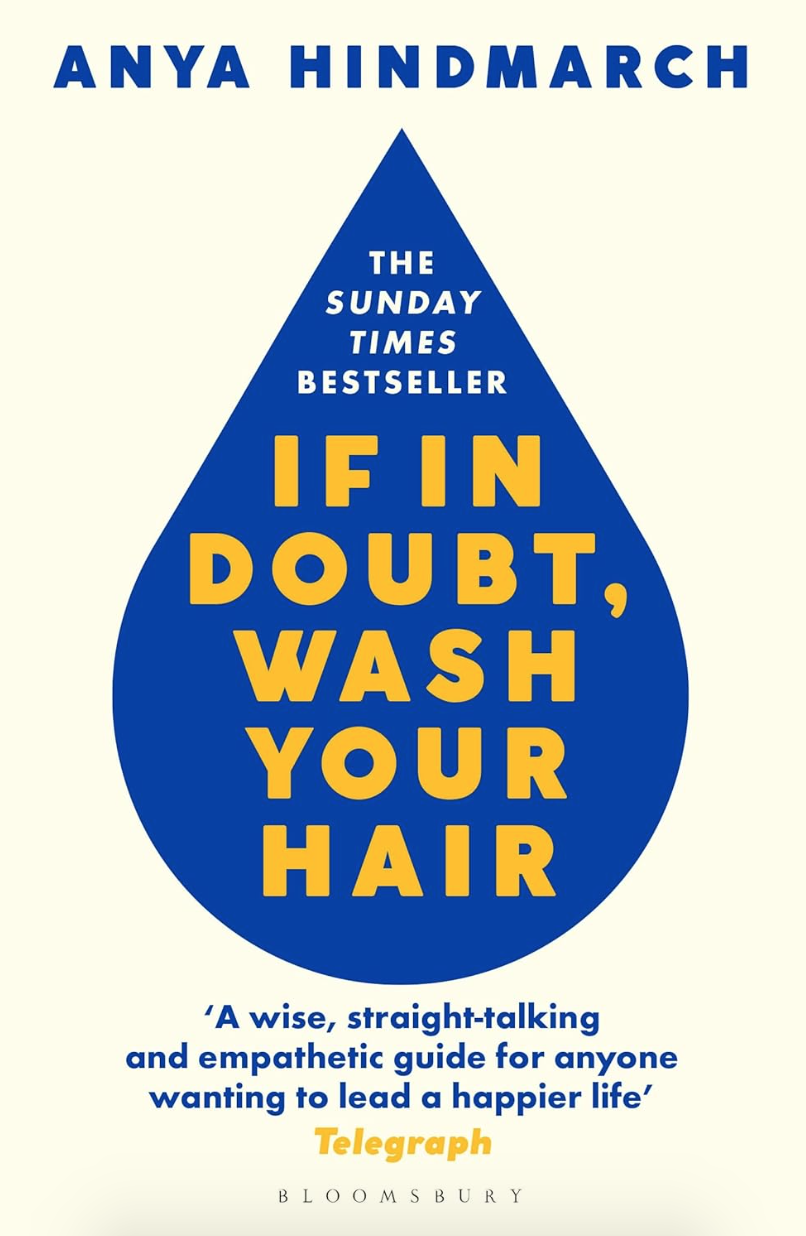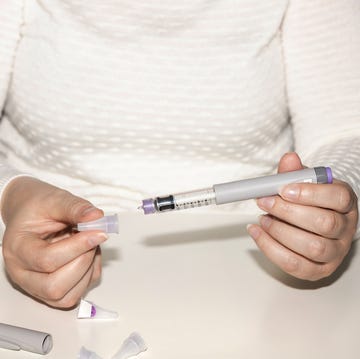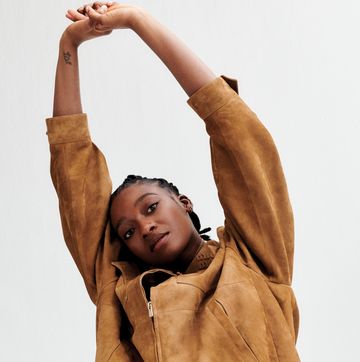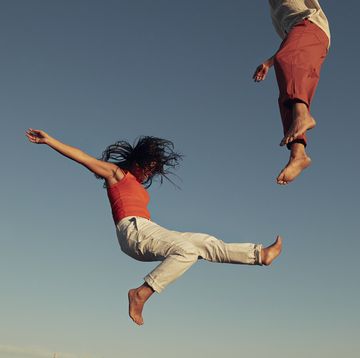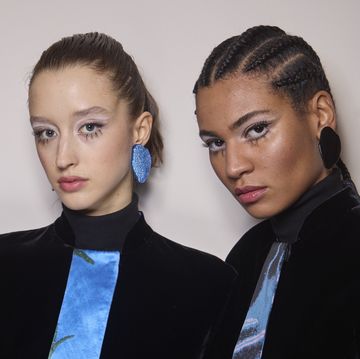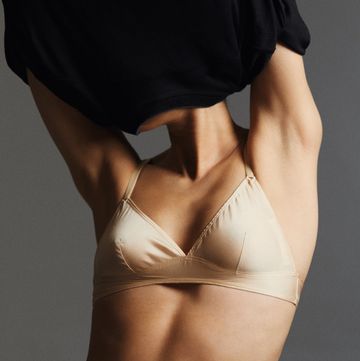At first, I thought it was a panic attack. I’d had those before. That all-too-familiar sensation of hands pressing on my chest, snaking around my throat, making each inhalation shorter than the last. I gasped for air. The room began to blur.
I tried to calm down, to do the one thing you’re told to do in difficult situations: breathe. But every attempt sent pain shooting across my chest. My efforts to fill my lungs felt futile. This wasn’t panic. Something else was wrong.
It took what felt like forever to subside. In reality, it was probably around 15 minutes. Panting, I reached out to feel carpet beneath my hands, realising I’d dropped to my bedroom floor. I saw the clothes I’d been carrying strewn around me. The tear tracks down my cheeks told me I’d been crying.
This was in December 2020, at the height of the pandemic. But it couldn’t be Covid-19. I’d had no other symptoms. I’d followed all the rules. I’d had two recent tests, in preparation for seeing family. Both clear. But the next day, I had another attack. Hours later, another. They seemed to come from nowhere – otherwise, I felt fine. The attacks became more frequent, and eventually sent me to hospital. There, tests confirmed my suspicions: the virus had found its way to me. It was unusual, the doctors said, not to present any expected symptoms, but not impossible. I should get better over my 10 days of mandatory quarantine. But, for me, the effects persist, inextricably weaving themselves into my everyday life.
It feels selfish to talk about my ‘struggle’, when so many have lost their lives. So I don’t really tell people I was unwell. I just talk about my ‘weird breathing’. Which is an odd thing to even discuss – I’ve never given much thought to my breathing before. We’re not supposed to. We take around 22,000 breaths a day: our body’s cycle of taking in air, extracting oxygen, expelling carbon dioxide. It’s pivotal to our existence and yet, most of the time, we don’t even notice we’re doing it. But, suddenly, the one thing that had always been effortless became the one thing I couldn’t control.
Control is something that has, in a way, ruled my life. I like to have it. I like to exert it. I like to be in charge of my thoughts, my body, work. I like being able to predict the results of my actions, to set a target and achieve it. I plan everything down to the tiniest detail – imagining every possible outcome so I’m prepared for anything. My friends have vowed never to throw me a surprise party, because they know I’d rather have planned it myself. So to suddenly lose my treasured autonomy was tougher than I could have imagined.
Breathing became all I could think about. Monitoring it was my new obsession: tracking my oxygen levels; testing how far I could push myself. I went from being completely independent to reliant on those around me. I spent months having meals made for me, just about moving from bed to desk to sofa and back again. Even walking to the bathroom left me exhausted; panting as if I’d been sprinting. I barely left the house. I didn’t really want to.
Something strange happens when your body stops working as it should. Your mind shifts. You feel untethered, like you’re drifting out to sea without any idea of how to get back. Physically, I was tired. Emotionally, I was exhausted. And it began to show. I got angry over the smallest things. I cried at TV shows (I never cry over TV shows). I stopped returning messages. There are only so many times you can jokingly reply to ‘How are you?’ with a Spotify screenshot of The Corrs’ Breathless. The reality felt too much to type: I didn’t feel like me anymore.
It took almost six months for me to get a long Covid diagnosis. According to a study by Imperial College London, up to two million people in the UK have had long Covid symptoms for at least 12 weeks. For some, that’s been breathlessness and extreme fatigue, like me, while others have had excruciating headaches, digestive issues and more. Why did it affect me so badly? I’m still not sure. It could be my age (I’m 29) or perhaps my gender – that same study found that long Covid rates were highest among those aged 25 to 34, and 14.7% of women had ongoing symptoms after three months, compared to 12.7% of men.
It’s also possible that my experience was completely random. In reality, no one knows how the virus will affect them until they experience it. ‘There’s a trajectory of illness that can vary in different groups of people,’ says Professor Gisli Jenkins of the National Heart & Lung Institute at Imperial College London. ‘And there are a lot of ways that your breathing can be damaged by Covid. If you damage your diaphragmatic muscles, you won’t suck as much air in. If you damage the alveolar membrane, you won’t get the oxygen travelling into your bloodstream. And there could be so many other problems at play. It’s something we are still trying to unravel.’
Not knowing anything for sure did not sit well with me. So while I waited for medical professionals to work out what was going on inside my body (still unknown), I turned to alternative methods, looking for something, anything that would give me relief. That’s how I found breathwork.
According to Richie Bostock, author of Exhale and founder of the breathing app Flourish, breathwork is ‘any time you intentionally become aware of your breath and use it to improve your physical and mental health, your performance and emotional wellbeing’. ‘The way you breathe affects just about every system in your body,’ Bostock says. ‘When you know how to use your breath purposefully, it can increase energy levels, rebalance hormones, heighten focus, improve sleep, digestion and cardiovascular health.’ This was exactly what I needed.
Luckily, breathing is the latest elemental human practice to be co-opted by the wellness industry. ‘Pre-2020, the interest in breathwork was already increasing rapidly,’ says Bostock, who is often referred to as ‘The Breath Guy’. But that’s not to say that a renewed focus isn’t necessary – especially now. ‘A pandemic involving a virus that can significantly affect the respiratory system has seen the number of people using breathwork for their physical health and emotional wellbeing explode,’ he adds.
And, apparently, there is a ‘wrong’ way to breathe: ‘Most people aren’t aware that they are breathing poorly,’ says Bostock. ‘The most common dysfunctional pattern I see is where people use their neck, shoulders and upper chest muscles (rather than the diaphragm) to expand the chest to take in air – as those muscles aren’t supposed to be used 24/7, this can activate the body’s stress response and cause pain.’ So, by trying so hard to breathe during my attacks, had I actually been stressing out my body – and myself – more?
A visit to my chiropractor, Dr Bav Raindi of the Chiropractic London Group, confirmed that’s what I’d been doing. I’d gone complaining of more shoulder pain than usual, and when I told him about my chest pain, he wasn’t surprised. ‘Your posture has changed,’ he said. ‘The muscles along your shoulders, upper back and across your chest have tightened and become shorter, while the muscles in the mid back have weakened and elongated, causing you to “hunch” over. This is common in people with shallow breathing – those muscles are overcompensating, putting increased pressure on the joints and therefore causing that pain.’
Learning that my breathing was having a knock-on effect for the rest of my body made me even more determined to fix it. I looked up breathwork tutorials on YouTube. I read books. I downloaded Fly LDN’s online app to remind me of the ‘belly’ breathing the yoga instructors tell us to practise during class. (Engage your diaphragm as you inhale, rather than those chest muscles, moving it downwards and pushing the belly out.) I tried box breathing (inhale for four seconds, hold for four, exhale for four and repeat – ideally for four minutes), alternate nostril breathing, that technique from Dr Sarfaraz Munshi’s now-viral YouTube clip, where you cough as you exhale to relieve mucus in the lungs. Some of those techniques worked, providing me with moments where I felt like I had some semblance of control over my body; that I could finally take in enough oxygen.
Over time, I began to see small signs of recovery: I could walk that bit further, climb a few more stairs, inhale more deeply without those sharp pains flashing across my chest. Emotionally, however, I was declining. Every time I left the house, the lingering fear of Covid followed. My mind swirled with ways I might catch it again. When we were allowed back inside restaurants, I still made friends sit outside. I developed an expensive habit of taking taxis everywhere, after the confined, airless spaces of public transport caused panic attacks. I felt vulnerable. This was a fragility I wasn’t used to.
City life began to feel claustrophobic. Parks were full of reunions and celebrations; groups gathered on every corner; queues snaked out of every shop I tried to visit. Everywhere I turned, there were people. People breathing in the same air as me, and potentially breathing out the virus that sent me into decline. The air seemed heavier, somehow: thick with pollution and weighed down with the possibility of infection. Whenever I went out, I felt like my throat was closing up. Even though I’d found coping mechanisms for my attacks, the problem hadn’t gone away: I still couldn’t breathe properly. Especially not in London. I needed space.
That’s how I found myself in a tent, wrapped in a duvet, listening to the rain hammer against the canvas. On a farm in Cornwall. At a retreat promoting nature’s healing benefits. Frankly, the last place you’d expect me to be. But Cabilla’s slogan – ‘We want you to leave feeling better than when you arrived’ – appealed in its simplicity. That’s what I craved. Not necessarily a physical transformation (doctors are working on that), but to feel better.
At Cabilla, nothing specific is required of you; no exercise regimes or forced activities. The point is to simply spend time outdoors. The farmland is a pollution-free site, and the lack of impurities in the air was palpable. I inhaled as deeply as the dull ache in my chest allowed. The air felt clean. Pure.
Cabilla is set in one of the UK’s only dark sky environments, which is obvious as night falls. The inky expanse overhead was completely clear, littered with the brightest stars I’ve seen. It was on my third night, sat under those stars, that I realised I’d begun to change.
Acres of ancient oak woodland had enveloped me from the moment I’d arrived: twisted trees curving into a dense canopy, bluebells carpeting the forest floor and scenting the air with a delicate perfume. Without realising, I’d been practising the Japanese art of forest bathing, or shinrin-yoku – the act of mindfully spending time in nature. A recent study found that just two hours of forest bathing can lead to improvements in physiological and psychological health, plus a decrease in blood pressure.*
As I walked through fields and forest and along the river each day, I suppose I was, without realising, practising box breathing – inhaling deeply and taking my time before exhaling slowly. But I wasn’t counting the seconds. I wasn’t tracking my oxygen levels. For once, I let my body tell me how it wanted to work. I felt energised, yet more relaxed than I had in months. I guess breathing ‘well’ can do that to you. ‘Deep, mindful breathing helps release endorphins, or the “feel-good” hormone,’ says Fly LDN yoga instructor Kate Hiley. ‘Our exhale is connected to our parasympathetic nervous system, which is responsible for our body’s rest and digest response. So taking deep breaths followed by a long, slow exhale can tell our body and mind that we are safe and can relax.’
It dawned on me that the more I’d worked at breathing ‘better’, the less progress I’d made. Apparently it’s common. ‘When Covid makes breathing difficult, you realise everything you took for granted is at risk. You start thinking about breathing – and when you do that, you breathe in a non-autonomous way,’ says Professor Jenkins. ‘As a result, your diaphragm moves in the wrong part of the respiratory cycle – when it should be going down, you might be trying to bring it up because you’re overthinking it. You start to work against yourself, which is where things can go wrong.’
With the work I’d been doing, trying (and often failing) to ‘win’ at breathing, I’d lost sight of what was going on. I’d been trying to control the uncontrollable, so kept ending up back at square one. But during those few days out of the city, when I’d stopped counting and measuring and stressing, I felt recalibrated – after more than half a year of feeling disconnected from my body, that synergy was on its way to being restored. It’s time to stop being disappointed at my body for not working as it should, and start appreciating how it has carried me through.
I can’t control my recovery or speed up the process, but I’m just grateful that it’s happening. Even though I still need breaks when I go for walks, and stairs often feel like climbing Everest, I’m slowly getting better. My mind still swirls with ‘what ifs’, and I know it will never fully calm down, but it is quieter now. And when those fears begin to creep in, I know what to do. Close my eyes. Count to four. And breathe.
*Environmental Health and Preventive Medicine, 2019.
This feature appears in the September issue of ELLE UK.






